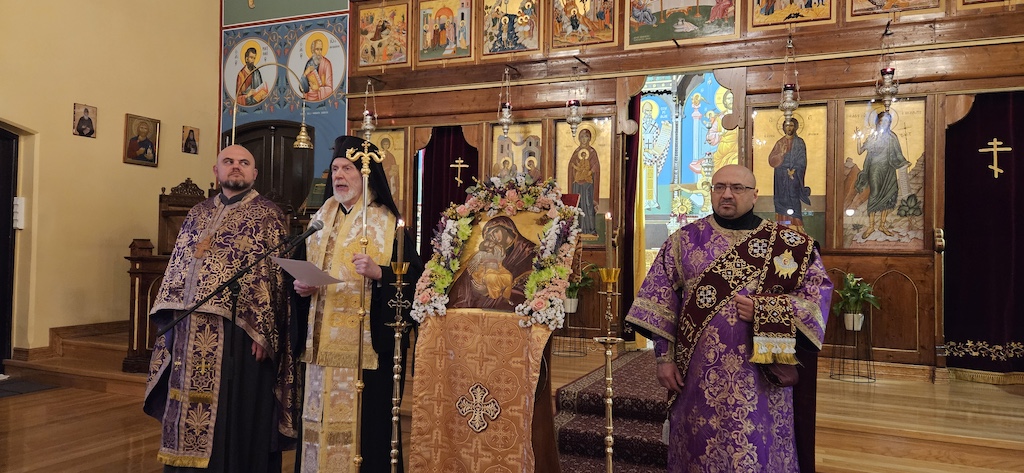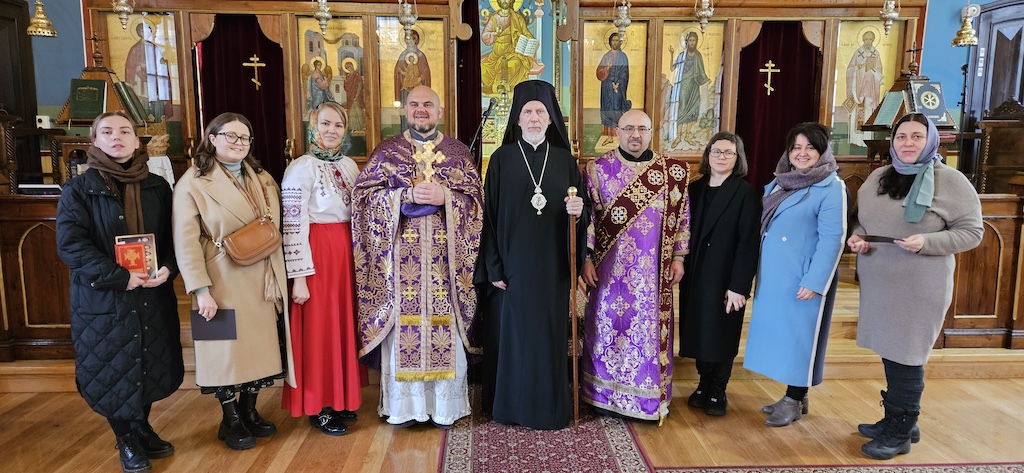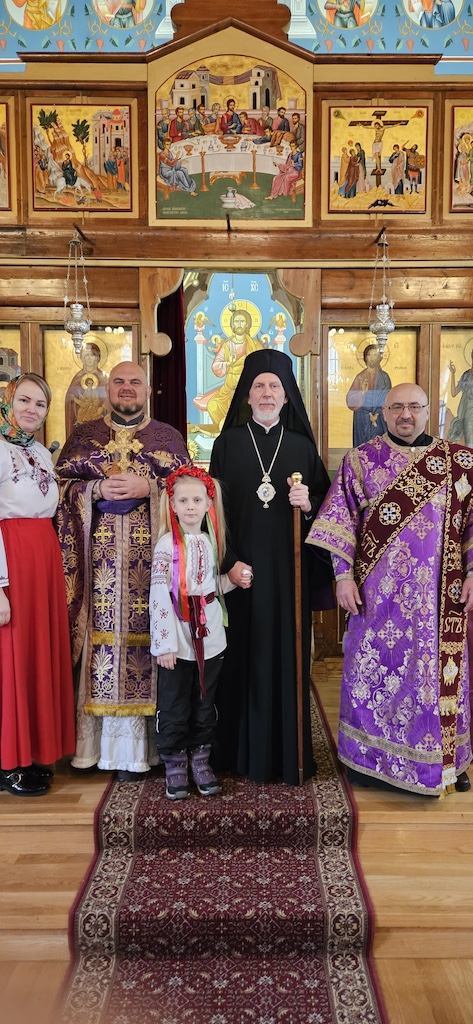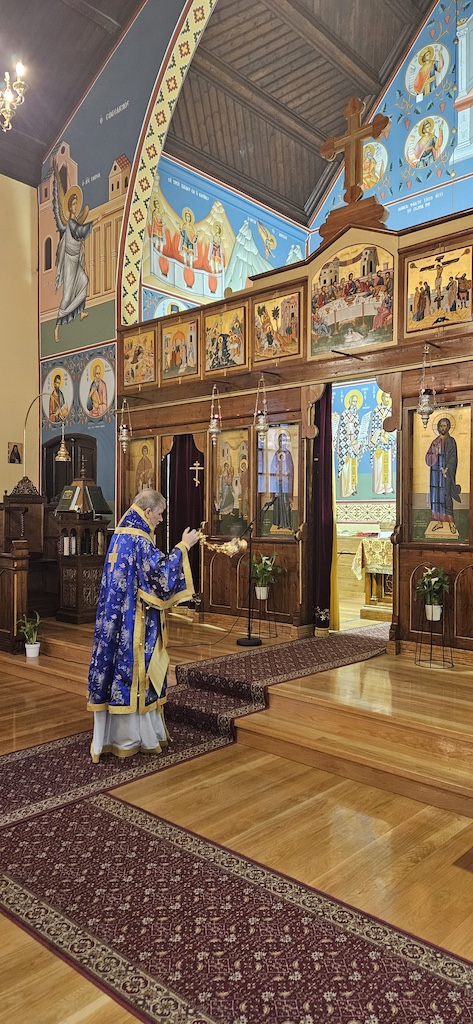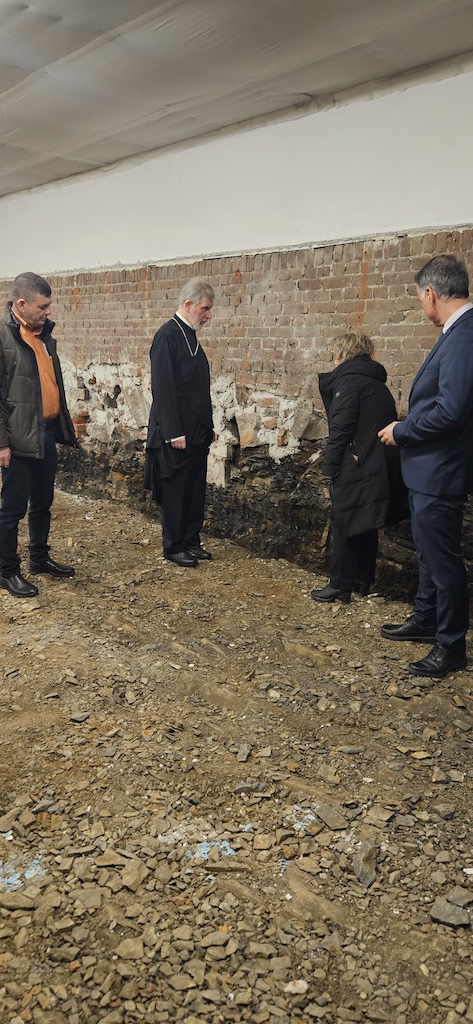On Friday afternoon April 5, 2024, His Eminence Metropolitan Cleopas of Sweden and All Scandinavia visited Oslo, where he presided over the third stanza of the Salutations to the Theotokos at the Annunciation Metropolitan Church in Oslo, aided by two Ukrainian clergymen, the Rev. Presbyter Fr. Vitalii Lohvin of the Holy Metropolis of Spain and Portugal and the Rev. Deacon Dr. Volodymyr Pozhydayev of the Holy Metropolis of Kyiv and All Ukraine.
In his sermon, among other things, the Metropolitan asked the faithful: “Allow me tonight to select two pictures from the spiritual gallery of the Akathist Hymn and present them to you for our spiritual benefit. They come from the verse we chanted: ‘Hail, vessel of those desiring salvation; Hail harbor of life᾽s watercrafts.’
Both these images come from the blessed sea. This imagery is beautiful, interesting, pleasant, modern, but it is also a beloved theme in the Holy Scriptures, which mention it to teach the faithful.
During his public ministry, our Lord never drifted too far from the Sea of Galilee. The hymnographers of the Church tell us that the sea is a mirror of life, reflecting both its tranquility and turbulence. Truly, the sea is our life, with a few moments of tranquility, joy, and happiness, and many waves, worries, and ordeals.
Due to its fishing industry, the sea also reminds us of Christian missionary work, where the word of God acts as our net. “Follow me and I shall make you fishers of men” (Mat. 4:19), Christ tells His disciples.
The sea is society, and Christ’s fishermen are the preachers of the Gospel. And so, we ministers of the Most High, in spite of our unworthiness, experience the blessing of spiritual fishing and every time we preach His word, we feel as if we are carrying Christ’s net in our hands!
Why, then, does the poet of the Akathist Hymn call the Theotokos a vessel and harbor? Clearly, because the Theotokos is the lifeboat that we climb onto from the deck of an endangered ship and saves us from the waves and death.
Salvation and paradise are inconceivable without our Lady the Theotokos! Through Eve’s disobedience, we were thrust into the waves of sin, and now, the new Eve has come to save us from the waves through her obedience. She becomes the lifeboat of “those desiring salvation.” Let us, therefore, not forget to send her our distress call when we are in need, and we can be certain that she will hasten to help us.
At the same time, the Theotokos is “the harbor of the watercraft;” in other words, the boats and other vessels that are being pounded by the raging waves threatening to sink them.
We are the watercraft. Every person, every soul is a watercraft traveling across the ocean of life. We are in search of tranquility, a harbor, safety, and where can we find these things? For us, there is only one safe harbor: our Lady the Theotokos!”
On Saturday April 6, the aforementioned clergymen celebrated the Divine Liturgy at the Annunciation Metropolitan Church in Oslo, in Ukrainian, for the Ukrainian-speaking faithful living in the surrounding area. Metropolitan Cleopas presided in chorostasia and conveyed the paternal blessings of His All-Holiness Ecumenical Patriarch Bartholomew at the end of the service, speaking in English on the feast of the veneration of the Holy Cross.
That same afternoon, the Metropolitan met with the members of the Annunciation Metropolitan Church’s parish council, where he was briefed on the progress of the complete renovation of the church fellowship hall. After the meeting, he officiated the service of Vespers.
The next morning, Sunday April 7, Metropolitan Cleopas celebrated the Divine Liturgy, assisted by the Rev. Deacon Dr. Volodymyr Pozhydayev, while the service was streamed live on the Facebook pages of the Holy Metropolis of Sweden and the local parish.
During his sermon, he spoke about the Gospel passage of the 3rd Sunday in Lent, noting: “In the Gospel passage that we read, the Lord invites us to freely accept His message. He doesn’t demand or blackmail, but rather, invites people to freely choose, to either accept His invitation or decline it, saying, ‘Whosoever wishes to follow me.’
What I would like to point out is that following His invitation, He informs us of the sole manner in which the faithful can make their momentary freedom permanent. The Lord speaks of that freedom that exists within the context of a person’s personal-inner life.
Our external freedom is certainly something of the highest importance and every person must be constantly concerned about safeguarding and securing it at all costs. Humanity’s progress in the area of external freedom has been amazing. The rights afforded to people regarding this in the so-called advanced nations are guaranteed in their constitutions. But how many of these people feel truly free and unfettered when they stand face to face with themselves? Unfortunately, egos, passions, weaknesses, and pettiness make people the worst manner of slaves internally. A peculiar sort of tyranny takes hold inside of people, which goes unnoticed on the outside. The Lord opens the way to break the internal fetters that crush the soul and lead to impasses.
Internal freedom comes from the ‘breaking’ of these internal bonds and is achieved only through self-denial: ‘Whosoever wishes to follow me, let him deny himself.’
The denial of ourselves concurrently secures for us our personal-internal freedom. You may be asking yourselves how it is possible for someone to attain freedom by denying themselves.
Here we must clarify that the Lord does not ask us to deny our physical existence or to erase our presence from society. Self-denial targets our existing according to ‘the flesh,’ which in the language of the Holy Scriptures, does not refer to the body, but rather, to that particular mindset according to which one thinks and acts in a state of the absence of God.
By denying our ‘will according to the flesh,’ we deny ‘the old self, along with its actions’ (Col. 3:9), as St. Paul the Apostle highlights. This denial is directed against sin, which overtakes our internal life and places us in a state that is outside of what we were intended. The denial of our sinful self represents the arrival of our internal freedom.
The words of St. Paul apply once again to the issue we are examining: ‘For freedom Christ has set us free. Stand firm, therefore, and do not submit again to a yoke of slavery’ (Gal. 5:1).
If great struggles and sacrifices are needed to safeguard external freedom, then likewise, internal freedom can only be gained with many sacrifices.
As we look upon the Holy Cross, let us contemplate its message. The Lord used this erstwhile instrument of shame to crucify our shame. It is our place to glorify Him and entreat Him that we may be made worthy to also venerate His holy Resurrection.”
Afterward, Metropolitan Cleopas was received by the congregation and joined them in fellowship at the reception that was offered by the parish in an adjacent hall.
Her Excellency Ms. Anna Korka, Ambassador of Greece to Norway, and the Honorable Consul of Greece in Oslo, Mr. Konstantinos Danassis, were in attendance at the Divine Liturgy, together with many faithful.
The hymns of the day were chanted in Greek, Norwegian, Ukrainian, Slavonic, Swedish, and English by Mr. Panagiotis Katsivalis, head chanter of the parish, Dr. Stig Simeon R. Frøyshov and Messrs. Kosmas Plakou and Porphyrios Erik Hasner.
That afternoon, Metropolitan Cleopas returned to his see in Stockholm.
Photo credit: Mr. Michael Bikoulis
